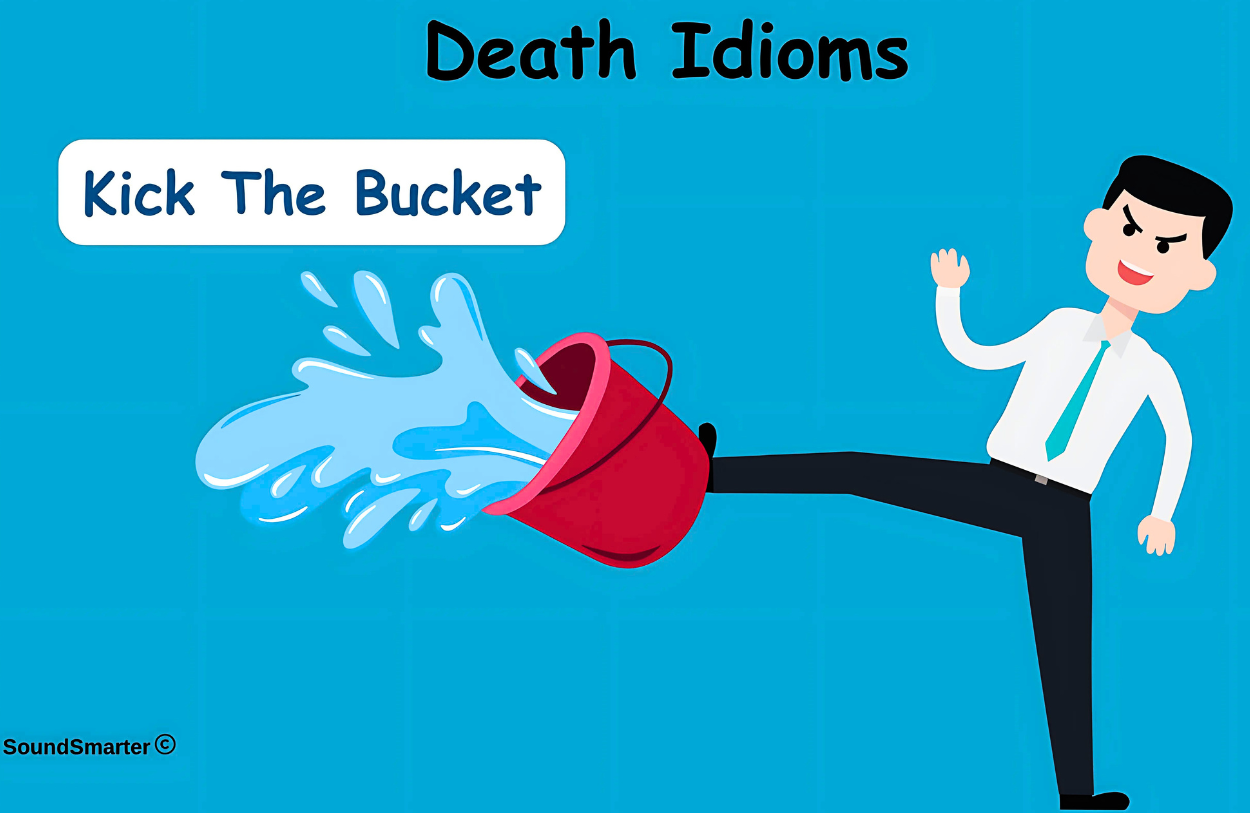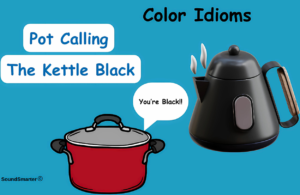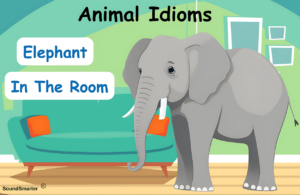Understanding Death Idioms: Sayings, Phrases And Expressions
Death idioms and expressions add a chilling, poetic undertone to our language, draping conversations in a shroud of finality and emotion. They paint vivid pictures of life’s inevitable conclusion, often evoking feelings that range from the melancholic to the darkly humorous, depending on the context and the expression.
Prepare to descend into a collection of death idioms and expressions, each one etched with its own profound significance, haunting origins, synonyms, and evocative example sentences.
Whether you’re intrigued by phrases like “bite the dust” or wish to grasp the solemn imagery behind “meet your maker,” this guide will help you enrich your language with expressions that whisper of life’s fleeting nature and the mystery of what lies beyond.
Ideal for lovers of language, storytellers, or anyone wishing to add a touch of the macabre to their speech, our compendium of death idioms and expressions will enshroud your conversations in depth and gravitas.
Ready your soul for a journey into the shadowy realm of death idioms and expressions, and uncover the stories and cultural significance that breathe life—and death—into these chilling phrases that add a timeless weight to our everyday language!
Table of Contents
Common Death Idioms & Expressions – Meaning, Origin, And Example Sentence
Kick The Bucket
Synonym: Die
Meaning: To die or pass away.
Origin: The phrase dates back to the 16th century, possibly referring to a person standing on a bucket while being hanged, and when the bucket was kicked away, they would die.
Example Sentence: He had a long, fulfilling life before he finally kicked the bucket at the age of ninety.
Bite The Dust
Synonym: Perish
Meaning: To die, especially in battle or a violent situation.
Origin: This idiom is believed to have originated from the 18th-century phrase “to bite the ground” in reference to soldiers falling in battle.
Example Sentence: Many soldiers bit the dust in the war, never to return home.
Pushing Up Daisies
Synonym: Dead and Buried
Meaning: To be dead and buried, often humorously implying that flowers grow over one’s grave.
Origin: The phrase comes from the idea that once someone is buried, daisies (or other flowers) may grow from the earth above their grave.
Example Sentence: After years of reckless behavior, it was no surprise he ended up pushing up daisies.
Pay The Ultimate Price
Synonym: Die
Meaning: To die as a result of one’s actions, usually in a situation involving risk or sacrifice, such as in combat or a dangerous mission.
Origin: The phrase is often used in military or heroic contexts, referring to the idea that death is the highest or “ultimate” price one can pay.
Example Sentence: The firefighter paid the ultimate price when he rushed back into the burning building to save a child.
Drop Dead Gorgeous
Synonym: Stunning
Meaning: Extremely attractive or beautiful.
Origin: This phrase emerged in the 20th century, combining “drop dead,” an expression of extreme emphasis, with “gorgeous.”
Example Sentence: She walked into the room looking drop dead gorgeous in that evening gown.
Meet One’s Maker
Synonym: Die
Meaning: To die and be judged by God or face the afterlife.
Origin: This phrase has a religious connotation, referring to the belief that one meets their Creator (God) after death.
Example Sentence: The outlaw knew he would eventually meet his maker due to his life of crime.
Do Or Die
Synonym: Critical Choice
Meaning: A situation where one must take decisive action, often with significant consequences.
Origin: This phrase originated in the 19th century, emphasizing the urgency and finality of a situation.
Example Sentence: It was a do or die moment for the team; they had to win the game to stay in the tournament.
Rest In Peace
Synonym: Deceased
Meaning: A phrase expressing the hope that someone who has died will find eternal peace.
Origin: The term comes from the Latin “Requiescat in pace,” used on tombstones and in Christian liturgy to wish the deceased a peaceful afterlife.
Example Sentence: She was a kind soul; may she rest in peace.
At Death’s Door
Synonym: Near Death
Meaning: To be very close to dying, usually due to illness or old age.
Origin: This phrase uses the metaphor of a door as an entryway to death, signifying someone’s proximity to it.
Example Sentence: After the accident, he was at death’s door, but fortunately, he recovered.
Kill The Goose That Lays The Golden Egg
Synonym: Short-Sighted
Meaning: To destroy a valuable resource through greed or foolishness.
Origin: This idiom comes from Aesop’s fable, written in the 6th century BCE, where a farmer kills a goose that lays golden eggs, thinking to get rich quickly.
Example Sentence: By cutting costs too aggressively, the company risks killing the goose that lays the golden egg.
Give Up The Ghost
Synonym: Die
Meaning: To stop living or cease functioning, often referring to a person or a machine.
Origin: This expression has biblical roots, originating from the King James Bible, where it is used to describe Jesus’s death on the cross.
Example Sentence: The old engine finally gave up the ghost after years of faithful service.
Skeletons In Your Closet
Synonym: Hidden Secrets
Meaning: Unpleasant or embarrassing secrets that one keeps hidden.
Origin: This phrase dates back to the 19th century, suggesting that having skeletons in one’s closet indicates hidden misdeeds.
Example Sentence: Everyone has skeletons in their closet, but it’s best to confront them rather than hide.
The Big Sleep
Synonym: Death
Meaning: A euphemistic way to refer to death as a long or eternal sleep.
Origin: Popularized by Raymond Chandler’s 1939 novel “The Big Sleep,” this term is used as a metaphor for death.
Example Sentence: After battling the disease for so long, he is now in the big sleep.
Dead Duck
Synonym: Ineffective
Meaning: A person or thing that is ineffective or doomed to failure.
Origin: This idiom originated in the 20th century, with “dead duck” referring to a duck that cannot fly or survive.
Example Sentence: After the budget cuts, the project was a dead duck with no chance of revival.
Cash In One’s Chips
Synonym: Die
Meaning: To die, likened to cashing in chips in a game of poker, which signifies the end of one’s turn.
Origin: The idiom originates from gambling, where players cash in their chips when they are done playing.
Example Sentence: The detective had solved his last case before he cashed in his chips.
Dead As A Doornail
Synonym: Lifeless
Meaning: Completely dead or inoperative.
Origin: This idiom dates back to the 14th century, possibly relating to nails that have been hammered in and cannot be reused.
Example Sentence: The old engine is dead as a doornail; we need to replace it entirely.
Kill Two Birds With One Stone
Synonym: Achieve Two Goals
Meaning: To accomplish two tasks with a single action.
Origin: This phrase has been used since the 17th century, emphasizing efficiency in achieving multiple outcomes.
Example Sentence: By carpooling to work, I can save gas and spend time with my friend, effectively killing two birds with one stone.
Dressed To Kill
Synonym: Elegantly Dressed
Meaning: Dressed very stylishly or attractively, often for a special occasion.
Origin: This idiom dates back to the 19th century, where it suggests that someone is dressed to impress and make an impact.
Example Sentence: For the gala, she was dressed to kill, turning heads as she walked in.
Six Feet Under
Synonym: Buried
Meaning: Dead and buried, as graves are traditionally six feet deep.
Origin: The phrase comes from the standard depth of graves, which is typically six feet.
Example Sentence: He’s been six feet under for almost a decade now.
Drop Dead
Synonym: Suddenly Die
Meaning: To die very suddenly and unexpectedly.
Origin: The phrase likely comes from the literal suddenness of someone dropping dead without warning.
Example Sentence: The man seemed healthy, but he dropped dead while jogging.
Go Belly Up
Synonym: Perish
Meaning: To die or fail completely; often used for both living beings and businesses.
Origin: This phrase dates back to the 19th century, likely derived from the image of a dead fish floating belly-up in water, a clear indicator of death.
Example Sentence: The company went belly up after the market crash.
Expire
Synonym: Die
Meaning: A formal way to say that someone has died; it also refers to something coming to an end.
Origin: Derived from the Latin word “exspirare,” meaning to breathe out, it was adopted in English in the late Middle Ages to refer to the final breath.
Example Sentence: The patient expired shortly after midnight, surrounded by loved ones.
Cross The River Styx
Synonym: Enter The Afterlife
Meaning: To die and cross into the afterlife, referencing Greek mythology.
Origin: In Greek mythology, the River Styx was the boundary between the Earth and the Underworld. Souls had to cross it after death.
Example Sentence: The hero fought bravely until he crossed the River Styx.
Bought The Farm
Synonym: Died
Meaning: To die, particularly in an accident or sudden event.
Origin: This phrase likely originated in the military during World War II, when a death payout would “buy the farm” for the deceased’s family.
Example Sentence: The pilot bought the farm during a training exercise.
Go To A Better Place
Synonym: Die Peacefully
Meaning: A gentle way to say someone has died, suggesting they have moved on to a peaceful afterlife.
Origin: This is a euphemism derived from religious beliefs that suggest a better existence after death.
Example Sentence: After a long illness, she went to a better place.
Pass Away
Synonym: Die
Meaning: A polite or gentle way of saying that someone has died. It is often used to soften the impact of the news.
Origin: The phrase “pass away” has been used since the 14th century as a euphemism for death. It draws on the idea of moving from life to death as a passage.
Example Sentence: After a long battle with illness, he passed away peacefully in his sleep.
Cross The Jordan
Synonym: Enter Heaven
Meaning: To die and pass into the afterlife, especially in a Christian context.
Origin: This phrase comes from the Bible, where the River Jordan is symbolically associated with crossing into the Promised Land, implying death. It became a popular idiom in the 18th century.
Example Sentence: The preacher spoke of crossing the Jordan to a better life beyond.
Go West
Synonym: Die
Meaning: To die, often used to imply a soldier or person has passed away.
Origin: This idiom became popular during World War I among British soldiers. The phrase “Go West” suggests the sun setting in the west, symbolizing the end of life.
Example Sentence: Many brave men went west in the Great War.
Join The Silent Majority
Synonym: Die
Meaning: To die, joining the countless deceased who are silent because they no longer live.
Origin: This phrase gained popularity in the mid-20th century and was later used in political contexts to refer to the larger group of non-vocal people, living or dead.
Example Sentence: The old revolutionary finally joined the silent majority.
Ride The Pale Horse
Synonym: Die
Meaning: To die, particularly in a dramatic or catastrophic manner.
Origin: The phrase comes from the Bible’s Book of Revelation (1st century), where Death is depicted as a rider on a pale horse.
Example Sentence: The legend says he rode the pale horse after the final battle.
Go Belly Up
Synonym: Perish
Meaning: To die or fail completely; often used for both living beings and businesses.
Origin: This phrase dates back to the 19th century, likely derived from the image of a dead fish floating belly-up in water, a clear indicator of death.
Example Sentence: The company went belly up after the market crash.
Go To The Great Beyond
Synonym: Pass Away
Meaning: To die and presumably enter an afterlife.
Origin: This phrase became common in the 19th century, implying a journey to a spiritual afterlife.
Example Sentence: He was a man of faith and believed he’d go to the great beyond.
Dance With Death
Synonym: Flirt With Danger
Meaning: To engage in very risky behavior that could lead to death.
Origin: This expression became popular in the early 20th century, symbolizing the idea of being close to death and “dancing” on the edge.
Example Sentence: The stuntman danced with death with each new daring act.
Slip Away
Synonym: Fade
Meaning: To die quietly or peacefully, often used for someone who passes away without much fuss.
Origin: This phrase appeared in English literature in the 18th century, depicting a subtle or unnoticed departure, applied to death.
Example Sentence: She slipped away in her sleep, surrounded by her family.
Flatline
Synonym: Die
Meaning: To die, particularly in a medical context where the heart stops beating.
Origin: The term originated in the mid-20th century with the advent of medical heart monitors showing a flat line when there is no heartbeat.
Example Sentence: The doctors worked hard, but the patient eventually flatlined.




